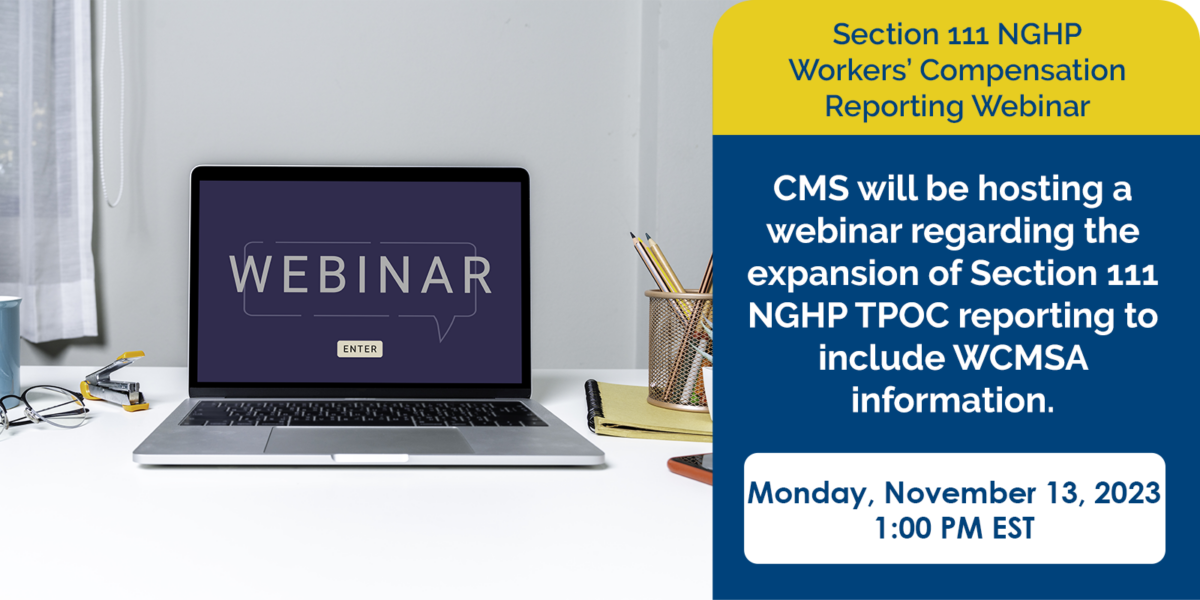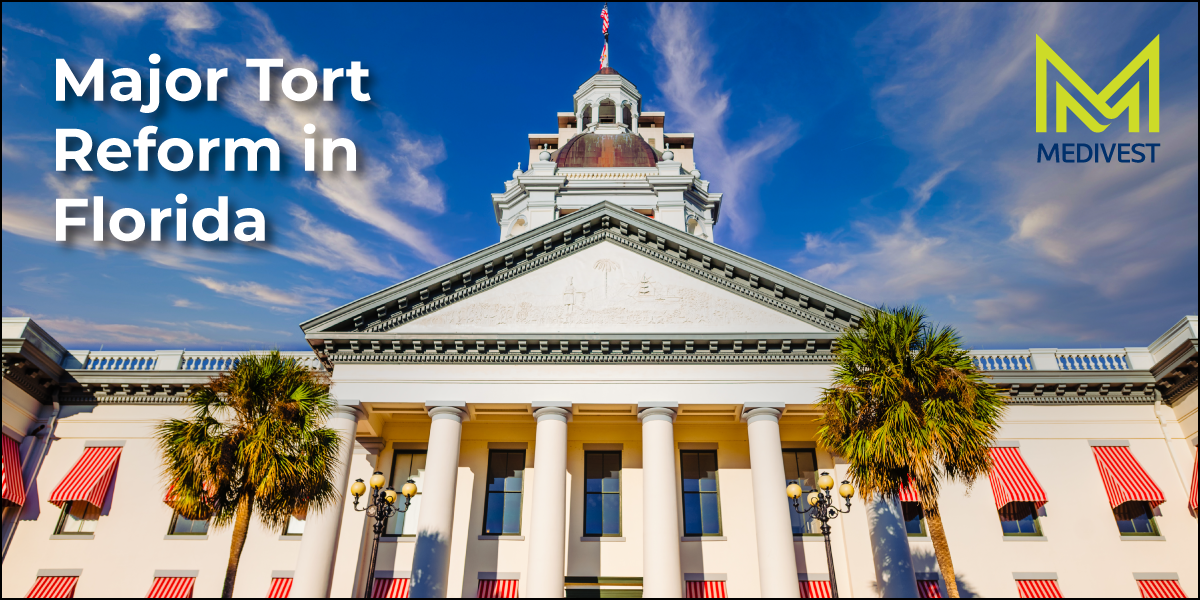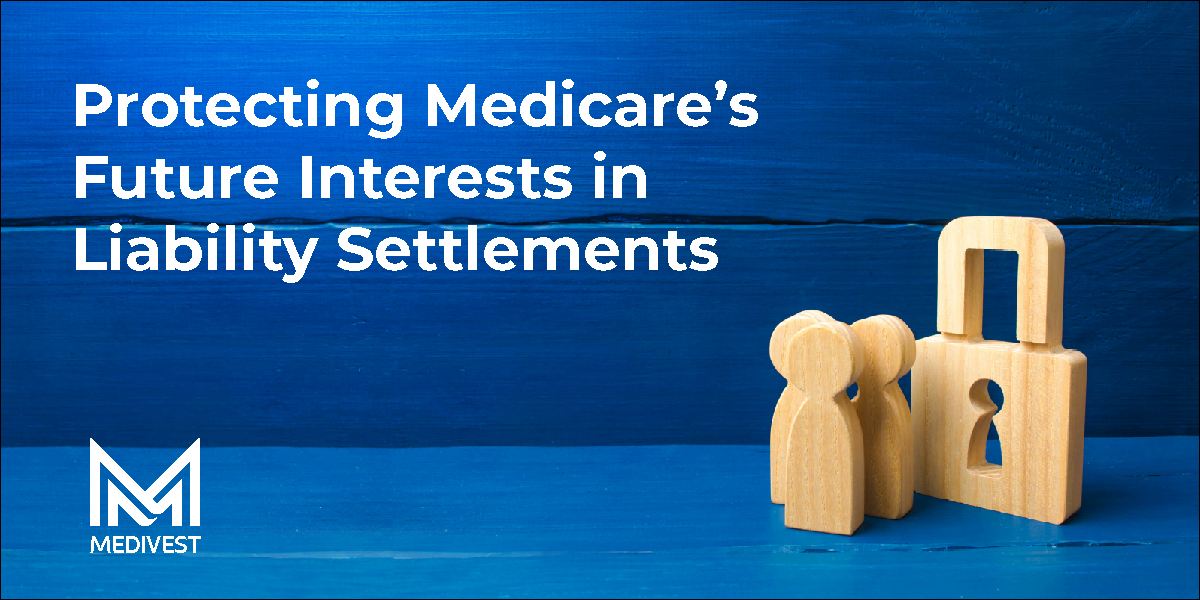Medivest will be exhibiting at the New Jersey Association for Justice's Meadowlands Seminar 2023, featuring three days of in-depth educational lectures on trial strategies and litigation techniques.
The Medivest Blog
CMS will be hosting a Section 111 Workers’ Compensation Reporting Webinar on Monday November 13, 2023 applicable to all primary plans considered Non-Group Health Plans (NGHP) including Liability Insurance (including Self-Insurance), No-Fault Insurance and Workers’ Compensation. Section 111 is also known as Mandatory Insurance Reporting and CMS will be focus its webinar on the expansion of Section 111 Non-Group Health Plan (NGHP) Total Payment Obligation to Claimant (TPOC) reporting to include Workers’ Compensation Medicare Set-Aside (WCMSA) information.
As usual, the format will include opening remarks and then a presentation by CMS that will include background and timelines, followed by a question-and-answer session. CMS has indicated that “because this expansion impacts reporting of WCMSAs, it is strongly recommended that Responsible Reporting Entities (RREs) who report Workers’ Compensation settlements attend.”
Date: November 13, 2023
Time: 1:00 PM ET
Webinar Link: htps://cms.zoomgov.com/j/1606789743?pwd=VzZ0Uk96ZWs1NUUvbm5xUnpJU2l4Zz09
Passcode: 100553
Or to connect via phone:
Conference Dial In: 1-833-568-8864
Conference Passcode: 160 678 9743
Due to the number of expected participants, please log in at least 10 minutes prior to the start of the presentation.
Additional information about recent updates from CMS can be found here. If you have questions on how topics discussed in this webinar may affect your clients, please contact Medivest here or call us at 877.725.2467.
On September 13th 2023, the Centers for Medicare & Medicaid Services (CMS) announced an upcoming increase to the maximum settlement amount for the Fixed Percentage Demand Calculation Option.
When settling a liability or workers’ compensation case, a beneficiary, or their attorney (or other representative) may request that Medicare’s demand amount be calculated using the Fixed Percentage Option. Currently the total settlement amount for the Fixed Percentage Option cannot exceed $5,000. Effective October 2, 2023, the maximum settlement amount will be raised to $10,000.
What is the Fixed Percentage Option?
The Fixed Percentage Option offers a simple, straightforward process to obtain the amount due to Medicare. It eliminates time and resources typically associated with the Medicare Secondary Payer (MSP) recovery process since you will not have to wait for Medicare to determine the conditional payment amount prior to settlement. The Fixed Percentage Option may be elected, if the following eligibility criteria are met:
-
-
- The liability insurance (including self-insurance) settlement, judgment, award or other payment is related to an alleged physical trauma- based incident and;
- The total settlement is for $5,000 (Note this amount will be raised to $10,000, effective October 2, 2023) or less.
- You elect the option within the required timeframe and Medicare has not issued a demand letter or other request for reimbursement related to the incident.
- You have not received and do not expect to receive any other settlements, judgments, awards, or other payments related to the incident.
-
For More Information
For additional information on the Fixed Percentage Option, please see the Fixed Percentage Option Presentation and the Fixed Percentage Model Language at CMS.Gov and consult the Downloads Section. To learn more about protecting the medical portion of your clients’ workers’ compensation and liability settlements, contact Medivest about Medicare Set-Aside Professional Administration.
The Colorado Trial Lawyers Association is the largest specialty bar association in Colorado, and their annual convention will begin August 3rd.
Medivest will be joining the Tennessee Trial Lawyers Association in Asheville, NC on June 14 for the 2023 TTLA Annual Convention.
On March 24, 2023, Governor Ron DeSantis signed House Bill 837 into law ushering in the most significant tort reform the state of Florida has seen in decades. The new legislation took effect immediately upon signing and will have a huge impact on the judicial system, particularly for personal injury cases against those at fault regardless of whether insured and in lawsuits directly against insurance companies when there are allegations of Bad Faith.
According to Governor Ron DeSantis, “Florida has been considered a judicial hellhole for far too long and we are desperately in need of legal reform that brings us more in line with the rest of the country. I am proud to sign this legislation to protect Floridians, safeguard our economy and attract more investment in our state.”
A Brief Summary
To read the new law in full detail click here. Some of the major highlights of the HB 837 that will have the most impact are as follows:
Modified Comparative Negligence Framework
Florida has in the past been a pure Comparative Negligence state so even if an injured party were more than 50% at fault for their injuries, they could make a claim for damages for the percentage of fault caused by a third party. Plaintiffs will now be barred from recovery if they are more than 50% at fault for their injuries. This change does not apply to actions based on medical negligence.
Two Year Negligence Statute of Limitations
The Statute of Limitations in negligence actions will cut the current statute in half. Claimants will now have two years from the time the cause of action accrues to file suit.
Limiting Bad Faith Lawsuits Against Insurers
The new law states mere negligence alone is insufficient to constitute bad faith in both statutory and common-law actions against an insurer. It also mandates the claimant and the claimant’s attorney to act in good faith when furnishing information regarding the claim, issuing demands, setting deadlines, and attempting to settle.
Attorney-Client Privilege for Treating Physicians
The referral and financial relationships between the plaintiff’s personal injury firms and the treating physicians will no longer be protected under attorney-client privilege.
Standards of Admissibility of Medical Evidence
HB 837 changes what constitutes admissible evidence in establishing past, present and future medical expenses. Going forward, the admissibility of evidence at trial of past medical treatment is limited to the amount actually paid to medical providers regardless of the source of payment (health insurance provider, workers’ compensation insurance carrier, etc.). Additionally, evidence offered to prove the amount necessary to satisfy unpaid charges will be limited to how much the claimant is obligated to pay if the claimant has health care coverage other than Medicare or Medicaid.
Regarding Attorney Fees
HB 837 eliminates multipliers for attorney fees with a presumption that the newly enacted Lodestar method is sufficient and reasonable. Additionally, many of the statutes that provide for one-way attorney’s fees in actions involving insurers have been repealed.
Presumption Against Liability of Property Owners
A new section of the Florida Statutes has been created with a presumption against liability for owners and operators of multifamily residential property in cases based on criminal acts upon the premises by third parties.
Questions About Your Liability Case?
Medivest offers a full suite of settlement solutions that address MSP exposure and protect Medicare’s interests in a liability settlement. For a free case consultation, click here and one of our settlement consultants will assist you.
Whether they are working for an employer or are an independent driver/owner-operator, truckers face a number of on-the-job risks that make the profession at higher risk than most others.
Obviously, driving on the road itself is a hazard. The National Highway Traffic Safety Administration (NHTSA) publishes annual statistics on motor vehicle crashes in the United States, including those involving trucks. The most recent data available is for the year 2020, during which there were 4,761 fatalities and 112,000 injuries in crashes involving large trucks. But for truckers, accidents are not just limited to the road. They can occur in parking lots, warehouses, and at other any other stops where they may load or unload their freight.
According to data from the Bureau of Labor Statistics, the trucking industry has a relatively high rate of workers’ compensation claims compared to other industries. The rate of workers’ compensation claims in the trucking industry was 2.6 claims per 100 full-time equivalent workers in 2019, compared to a rate of 0.8 claims per 100 full-time equivalent workers across all industries. However, this does not fully portray the true number of accidents and risk, as many truckers will not qualify for workers’ compensation due to their status as an owner-operator.
Determining the Liable Party
Truck accident cases are complex because of the numerous parties involved in the industry. Determining who is liable can be a difficult process for the settling parties. Depending on the cause of the accident, the fault could either be the truck driver, another driver on the road, a maintenance provider, a manufacturer or even multiple entities may share fault. All of these factors are weighed when liability is being assessed.

Employment Status May Make Difference
For a driver who is employed by a trucking company, the accident and claims process is typical and is usually handled directly by their employer. However, independent truckers/owner-operators may have a more complicated situation on their hands. More factors are potentially at play and need to be considered in the event they are an accident victim.
If an owner-operators is injured while working, they may be eligible for workers’ compensation benefits if they are considered an employee under the relevant state law. The specific requirements for qualifying for workers’ compensation benefits vary by state and may depend on factors such as the nature of the work being performed, and the degree of control exercised by the trucking company over the owner-operators ‘s work.
If the owner-operators is not eligible for workers’ compensation benefits, they may be able to pursue a personal injury claim against the trucking company or other parties who may be responsible for the accident. This could include claims for medical expenses, lost wages, pain and suffering, and other damages related to the injury.
The owner-operator should consult with an attorney who specializes in personal injury law to understand their legal options and to ensure that their rights are protected. An attorney can also help them navigate the claims process and negotiate with insurance companies on their behalf.
The Right Tools for a Transportation Related Settlement
Additionally, a representing attorney needs to consider if all needs have been met for an optimized settlement. Are any of the following services needed in order to get the maximum settlement and ensure that the medical portion of the settlement is protected?
- Lien Investigation and Resolution to determine if all medical bills have been addressed and negotiated
- Medicare Set-Aside Proposal to consider Medicare’s interests
- Medical Cost Projection Report if Medicare’s interest do not need to be considered
- Professional Administration experienced in handling both Workers Compensation and Third-Party Liability simultaneously
- Trust Advisor Services to protect public benefits
For questions about any of these services or best practices for preparing for a transportation related settlement, please call us at 877.725.2467 or contact Medivest here.
The Society of Settlement Planners is dedicated to providing our members with the latest resources, solutions, and tools available to planners across the country. The 2023 Annual Conference will feature select sessions incorporating attendee engagement with panels and speakers, live Q&A, and more.
Medivest will be joining the Ohio Association for Justice from November 2 - 4 for its annual Winter Convention. This year's Winter Convention kicks off the OAJ Advocate's Academy, a four-event sequence specifically designed as a training ground to accelerate the performance of newer plaintiffs' attorneys.











